Introduction
Rensselaer Polytechnic Institute is committed to maintaining a safe and healthy learning, living, and working environment in which no member of the Rensselaer community is excluded from participation in, denied the benefits of, or subjected to discrimination in any Institute program or activity.
Discrimination based on sex or gender, including but not limited to sexual harassment, sexual assault, intimate partner violence, and stalking, are forms of illegal discrimination in that they limit an individual’s ability to participate in or benefit from the Institute’s programs or activities. Rensselaer responds to such reports of sexual misconduct pursuant to the Student Sexual Misconduct Policy, which is applicable to students of Rensselaer, and/or the Non-Discrimination/Equal Employment Opportunity Policy, which applies to faculty, staff, vendors, visitors, and other third parties. Definitions of prohibited conduct and detailed explanations of the procedures used to review and resolve complaints can be found in those policies.
In addressing reports of sex- and gender-based discrimination, harassment, and violence, Rensselaer’s objective is to stop any misconduct that is occurring, address its effects, and prevent its recurrence. Reports are investigated and determinations rendered based on the Preponderance of Evidence standard; that is, whether the evidence available to Rensselaer shows it is more likely than not that the reported conduct occurred and violated Rensselaer policy.
This Title IX Summary provides an overview of all reports of sexual misconduct involving one or more Rensselaer students received by Rensselaer during the 2017-2018 academic year (July 1, 2017 through June 31, 2018). Reports of misconduct by an employee, contractor, visitor, or other third party against another employee, contractor, visitor, or other third party are not included in this Summary. The information is provided in aggregate form, without identifying information and without details of any allegations that could be used to identify the individuals involved. Rensselaer is committed to maintaining the privacy and dignity of individuals involved in Title IX complaints, and to complying with the Family Educational Rights and Privacy Act (FERPA) as well as the privacy provisions of New York State Education Law Article 129-B and other state and federal statutes.
To report an incident of sex- or gender-based discrimination or misconduct to the Institute, or to request assistance reporting an incident to local law enforcement or the New York State Police or requesting an Order of Protection from Family Court, please contact a Title IX Coordinator or the Rensselaer Department of Public Safety. Anonymous reports may also be submitted on Rensselaer’s Title IX Website, https://SexualViolence.rpi.edu. Confidential care and support services are available on and off campus 24 hours a day.
Sexual Misconduct Reports
During the 2017-2018 academic year, Rensselaer received 74 reports of sexual misconduct involving at least one Rensselaer student.
That number represents a 200% increase on the reports Rensselaer received during the 2016-2017 academic year, and nearly a 400% increase over the 2015-2016 academic year.
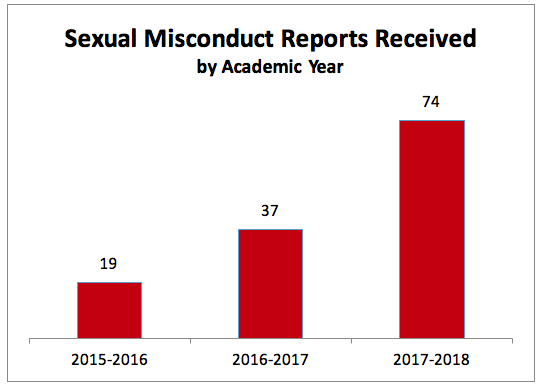
Figure 1
Of the reports received during the 2017-2018 academic year, 34 alleged a violation of Rensselaer’s prohibition of Sexual Assault, 23 alleged an incident of Sexual Harassment, 10 alleged Intimate Partner Violence, and 7 reports alleged Stalking.
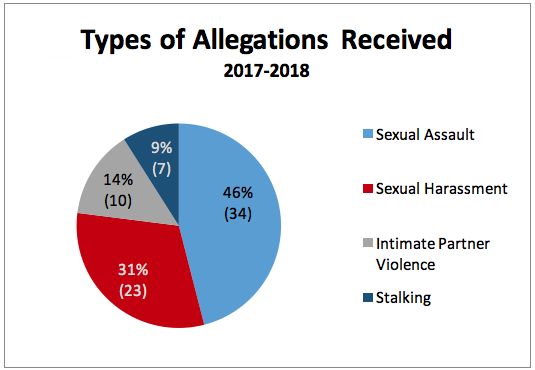
Figure 2
Complaints were received from current Rensselaer students as well as third parties, which included former students and students at other universities. The Respondents (accused persons) in those complaints included current Rensselaer students, current and former employees of Rensselaer, contractors that work on Rensselaer’s campuses, and third parties including former students, alumni, and visitors. The status of some Complainants and Respondents remains unknown. This may be the result of an anonymous report that does not include sufficient information, a Complainant choosing not to participate or provide additional information about the Respondent, or an offense in which the perpetrator was not known to the Complainant.
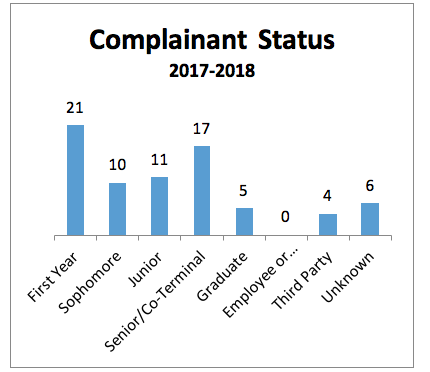
Figure 3
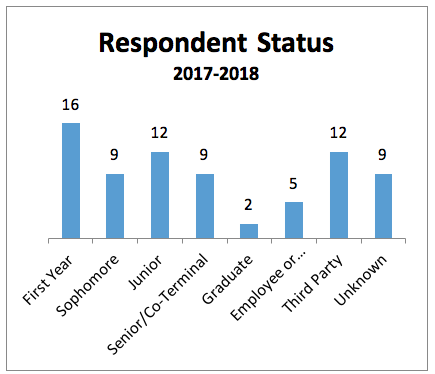
Figure 4
Rensselaer’s Student Sexual Misconduct and Non-Discrimination Policies apply equally to all individuals, regardless of sex, gender, sexual orientation, gender identity or gender expression.
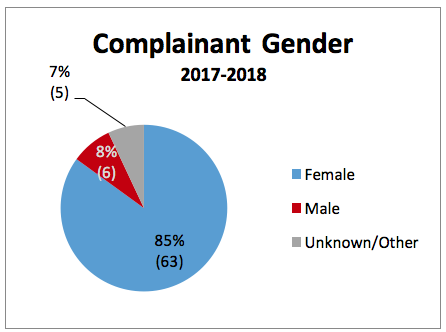
Figure 5
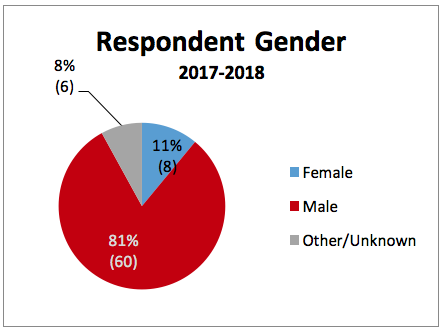
Figure 6
Outcomes
Reports of sexual misconduct can be resolved in a number of different ways.
The Student Sexual Misconduct Policy provides for both formal and informal resolutions. Formal resolutions involve a thorough investigation, a determination by the Case Management Team that a policy violation has or has not occurred, and, in some instances, a hearing before a panel of faculty and staff. Informal resolutions are a mediated outcome, most often consisting of a No Contact Order and/or an educational activity, and are only undertaken in cases in which the Complainant, Respondent, and Case Management Team agree informal resolution is appropriate. Informal resolutions are not allowed in cases in which there has been an allegation of physical or sexual violence.
Some reports are made anonymously and contain insufficient information to pursue an investigation, while in other instances a Complainant may decline to participate in an investigation. When a Complainant declines to participate or requests that there be no investigation of a complaint, the Case Management Team determines whether that request will be honored based on the specific circumstances of the case and the seriousness of the allegation. Cases can also be closed after initial review if it is found that the conduct, if it occurred as alleged, would not fall under the Student Sexual Misconduct Policy, the Non-Discrimination Policy, or Title IX, and after investigation if it is not possible to determine who is responsible for the alleged conduct.
Of the 74 reports received during the 2017-2018 academic year, 18 were closed due to insufficient information, Complainant non-participation, or a determination that the allegation did not fall under Title IX or the person responsible could not be identified. Informal Resolutions were reached in 8 cases, while the remaining 48 reports were resolved through the Formal Resolution process. Of those 48 cases, 43 had reached a determination and exhausted all available appeals at the time this report was written. There were 20 policy violations found, and 23 cases in which no policy violation was found.
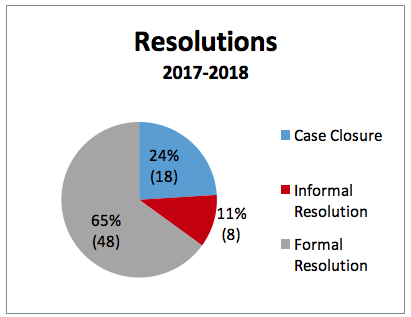
Figure 7
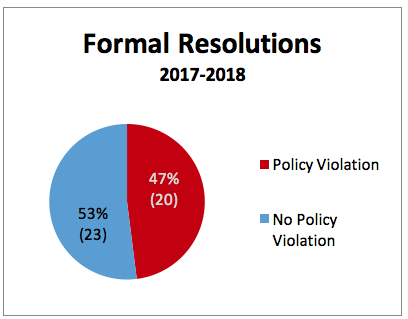
Figure 8
When a policy violation is found, and a Respondent has agreed with the determination or been found in violation after exhausting all appeals available to them, a sanction is imposed. Sanctions are issued based on the specific facts and circumstance of each individual case.
In cases in which the Respondent is a Rensselaer student or employee, a range of sanctions and corrective actions are available. Oftentimes, an educational assignment or activity is required in addition to the listed sanction. If the Respondent is not a Rensselaer student or employee, Rensselaer does not have the authority to impose sanctions, but can take others actions such as issuing a Notice of Persona non Grata prohibiting the Respondent from entering property owned or controlled by Rensselaer or attending Rensselaer-sponsored events. Also, upon request at any time in the process, Rensselaer can assist any individual in making a report to law enforcement, applying for an Order of Protection in Family Court, or accessing other services and resources on campus and from community partners.
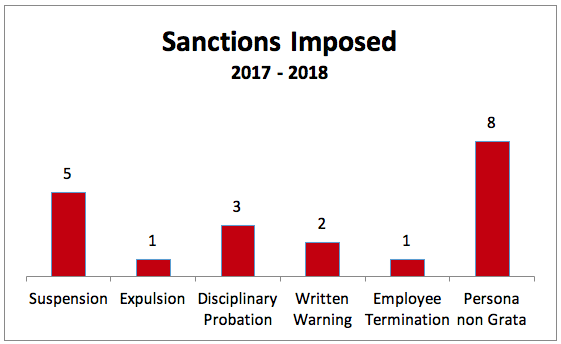
Figure 9
High Risk Poplulations
Rensselaer is required by law to analyze its student sexual misconduct reports, identify “high risk” populations on its campus, and ensure that those populations receive necessary education and training to reduce the occurrence of sexual misconduct.
Between 2015 and 2017, Rensselaer identified three student groups that were more frequently involved in reports of sexual misconduct than others: First Year Students, Student Athletes, and Greek Organizations.
As a result, Rensselaer strengthened its sexual violence prevention education and bystander intervention programming, which is required for all First Year Students and Student Athletes. During the same time period, Rensselaer annually presented sexual violence prevention and bystander intervention education to the members of the Interfraternity and Panhellenic Councils, and offered the same training to all Greek organizations on campus. Many fraternities and sororities voluntarily hosted those educational events.
First Year Students
First Year Students comprise 26% of the undergraduate student body at Rensselaer. Of students involved in sexual misconduct reports during the 2017-2018 academic year, 28% of Complainants and 22% of Respondents were First Year students. This reveals a significant decrease from the representation of First Year Students among Sexual Misconduct Complainants during the 2015-2016 and 2016-2017 academic years, and brings both numbers close to their representation among the undergraduate population.
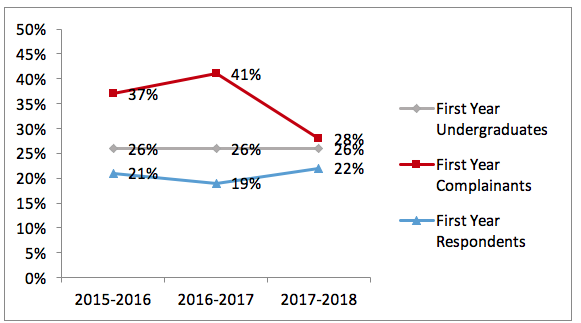
Figure 10
Student Athletes
Student Athletes make up approximately 10% of the undergraduate student body at Rensselaer. Of students involved in sexual misconduct reports during the 2017-2018 academic year, 4% of Complainants and 4% of Respondents were Student Athletes. This reveals a significant decrease from the representation of Student Athletes among Sexual Misconduct Complainants and Respondents during the 2015-2016 and 2016-2017 academic years, and brings both numbers below their representation among the undergraduate population.
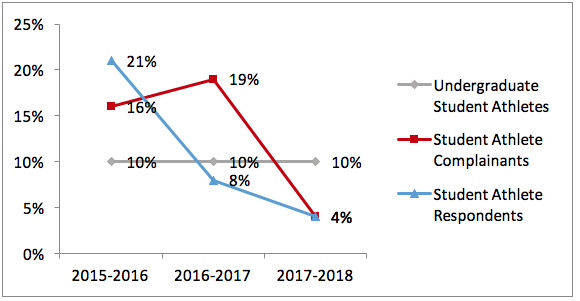
Figure 11
Greek Organizations
Members of Greek organizations make up approximately 23% of the undergraduate student body at Rensselaer. Of students involved in sexual misconduct reports during the 2017-2018 academic year, 12 % of Complainants and 30% of Respondents were members of Greek organizations. This reveals a significant decrease from the representation of Greek members among the Respondents in previous years, although Greek Respondents still outnumber their representation among the undergraduate population.
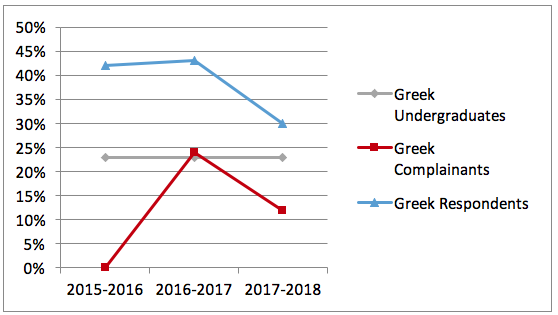
Figure 12
However, Rensselaer also tracks the number of reports of all Student Sexual Misconduct incidents (Sexual Assault, Sexual Harassment, Intimate Partner Violence and Stalking) that allegedly occurred inside a Greek house or arose from a party at a Greek house. Those numbers show a different trend, with a 400% increase over the last two years.
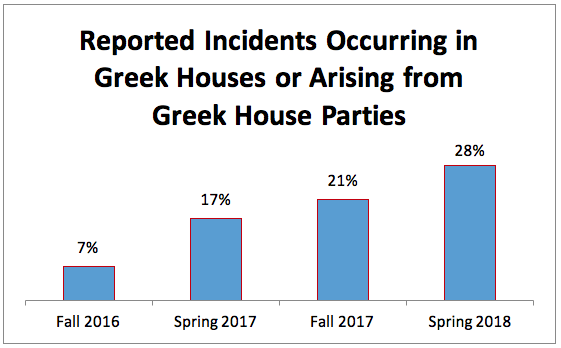
Figure 13
Furthermore, Rensselaer received 17 Sexual Assault reports that allegedly occurred inside a Greek house or arose from a Greek house party during the 2017-2018 academic year. That represents 50% of Sexual Assault reports received by Rensselaer during the same time period. All of those involved the use of alcohol and/or illegal drugs.
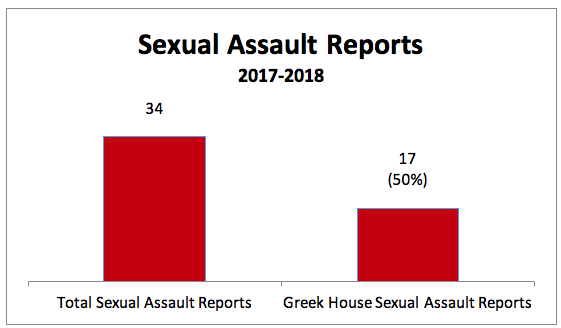
Figure 14
Data Reporting
Rensselaer is required by law to assess and respond appropriately to every report of sexual misconduct it receives. The numbers provided in this Title IX Summary represent the totality of the reports received during the 2017-2018 academic year.
Rensselaer is also required by federal law to publish annually its “Clery Act” crime statistics, and by New York State law to publish annually its “Article 129-B” statistics[1]. These laws provide very specific and restrictive standards by which reports are to be counted. Unlike this Title IX Summary, they do not provide information on all reports of sex and gender-based misconduct received by Rensselaer.
Both laws utilize the FBI Uniform Crime Report definitions of the crimes of Rape, Incest, Statutory Rape, and Fondling, and the Clery Act definitions of Domestic Violence, Dating Violence, and Stalking. These definitions are far more limited than the conduct prohibited by Rensselaer’s policies.
Rensselaer holds its community to higher standards and, as is required by Title IX, defines sexual misconduct more broadly than the Uniform Crime definitions allow. For example, most instances of sexual harassment reported to Rensselaer do not meet the definitions of those crimes and would not be counted in the Clery or 129-B statistics. Similarly, emotional abuse between intimate partners does not meet the definition of Dating or Domestic Violence for the purpose of Clery or 129-B data reporting, but does constitute a violation of our Student Sexual Misconduct Policy. As another example, the Uniform Crime definition of Fondling requires that sexual contact be made for the purpose of sexual gratification, while Rensselaer’s policies prohibit any non-consensual sexual contact, including those instances motivated by a desire to embarrass, shame, offend, or intimidate the victim.
There are also differences in the individuals and geographic locations covered by those laws and by the data provided in this Title IX Summary. While this Summary includes all complaints involving a student of Rensselaer, regardless of where the incident occurred, Clery statistics only count reports of crimes that occurred on or contiguous to property owned or controlled by Rensselaer, and counts all reports received by the Institute or law enforcement agencies, regardless of whether the individuals involved were students, staff, visitors, or unaffiliated with Rensselaer. The data collected pursuant to Article 129-B, meanwhile, covers both on- and off-campus locations, but only counts reports of crimes involving a current student. Furthermore, Rensselaer counts Student Sexual Misconduct cases by the number of Respondents, while the Clery Act and Article 129-B count the number of reports received, even if a report alleges misconduct by more than one individual.
Conclusion
In the 2017-2018 academic year, Rensselaer redoubled its efforts to provide bystander intervention and sexual misconduct awareness and prevention training to our campus community. Rensselaer also received a record number of Title IX reports. This increase in reporting was likely influenced at least in part by greater awareness of reporting options and by the #MeToo movement and the resulting national conversation about sexual discrimination, harassment, and violence. While the involvement of the identified high-risk groups (First Year students, student athletes, and members of Greek organizations) decreased significantly from previous years, the percentage of incidents allegedly occurring inside a Greek house or arising out of a party at a Greek house increased, revealing a high risk situation that transcends Greek membership and affects our entire student body.
Rensselaer remains committed to ensuring that our students, faculty, staff, and visitors are able to enjoy all that Rensselaer has to offer in a welcoming and inclusive culture that fosters care and respect for one another, and that is free from discrimination, harassment, and violence. To that end, during the 2018-2019 academic year we will be making new interactive and relevant workshops available to our students to expand on the sexual and interpersonal violence prevention education they are already receiving. Rensselaer will also be making changes to our policies and practices to provide greater accountability for all involved in the student sexual misconduct process and to reaffirm our promise to address all reports of sexual discrimination, harassment, and violence in a prompt, equitable, and compassionate manner.
Footnote
[1] Although this data will be collected annually on October 1st, starting with the publication of data for calendar year 2018 on October 1, 2019, the New York State Education Department requested, and Rensselaer provided, so-called “interim data” counting complaints received during the 2018 spring semester. That data are incomplete, inasmuch as several complaints had not yet been resolved at the time the data were submitted, and additional complaints were received. Furthermore, the interim data do not include any reports received during the first half of the 2017-2018 academic year.
